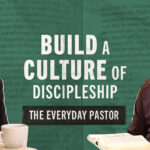The following 20 quotes caught my attention as I read Scott Sauls’s new book, Befriend: Create Belonging in an Age of Judgment, Isolation, and Fear (Tyndale House, 2016) [interview | excerpt | excerpt | review]. Thanks to Tony Reinke for inspiring the 20 quotes idea.
“In Jesus, our judgment day was moved from the future to the past.” (13)
“After 18 years of pastoral ministry, I have never met a person who fell in love with Jesus because a Christian scolded them about their ethics. Have you?” (18–19)
“The more we walk the narrow path, the wider our communal embrace will be. The more convinced we are of the exclusive claims of Jesus—that he is the way, the truth, and the life and no one comes to the Father except through him—the more inclusively kind and compassionate we will be.” (22)
“We must become convinced that Love has to be a person to us before it can become a verb.” (23) 
“Jesus invites us—especially when marriages and friendships get difficult—to see ourselves and each other as he sees us. Jesus sees us and knows us with an everlasting love, with a love that has saved us from ourselves and that guarantees our future perfection. In our present condition, Jesus sees us as the acorns that will become oak trees, the apple seeds that will become orchards, the caterpillars that will become butterflies, and the random cacophonies of words and notes that will become musical masterpieces.” (71)
“Unlike the liberation of slaves spoken of in Philemon, there is no place in Scripture that pronounces liberation for those wishing to pursue sexual relationships, including committed and monogamous ones, outside of the male-female marital union. . . . This teaching is unpopular in our late modern times. Yet if the true relevance of Scripture is that Scripture shows no interest in being relevant—that is, that it shows no interest in being adapted, revised, or censored in order to be more in tune with the ever-shifting times—then the sex question is one that sincere believers have to wrestle with. We must remain countercultural where the culture and the truth are at odds with one another. This, and this alone, is what will make Christians truly relevant in the culture.” (75)
“Compelled by the love of Christ, we must not withhold kindness or friendship from any person or people group, and we must not engage in any sort of us-against-them posturing. This in itself is countercultural in modern society. Compelled by the truth of Christ, we must honor and obey the Creator’s design—even when his design is countercultural and, at times, counterintuitive to us. His ways and his thoughts are higher than ours.” (75–76)
“This is what you call reversing the flow of the umbilical cord: parents demanding that their children function as their source of life; their emotional nourishment; their identity; their Jesus. This always ends in sorrow and alienation and loss. Just as in marriage, we must not place a burden on our children to provide for us the things that only God can supply.” (87–88)
“The best way to measure your desire to serve is to look at how you respond when someone treats you like a servant.” (98)
“Death and sorrow are merely a middle chapter.” (104)
“A first step toward true diversity—whether cultural, economic, political, ethnic, or otherwise—is to recognize that charity toward minorities by itself is not enough. Charity, to be truly charitable and biblical, must also result in empowerment, where the majority humbles and positions itself to follow the minority voice regularly. Especially where injustice and inequality exist, the majority must proactively seek out ways to surrender microphone and gavel rights to the minority. Invitations to give ‘input’ must be replaced with opportunities to lead. Crumbs from the table must be replaced with a seat at the table. Otherwise, we remain stuck with an anemic, counterfeit diversity. Otherwise, particularly as pertains to race, we remain stuck with only stuff that white people like.” (128) 
“Why would Jesus tell the rich ruler to give everything to the poor but not demand the same of Abraham or Job? It was because the rich ruler didn’t really have money. Money had him. The man who thought he couldn’t live without his money, in truth, wouldn’t be able to live with it.” (135)
“Sometimes ‘charity starts at home’ is just a veiled way of saying that charity ends there too.” (164)
“Barabbas, the man of violence, is embraced as a freedom fighter. Jesus, the man of peace, is caricatured and crucified as an enemy of the state.” (173)
“This is what partisans do. Partisans exaggerate the best features of their side and the worst features, real or contrived, of the opposing side. They minimize and overlook the weaknesses of their side, while dismissing the best features of the opposing side. What you end up with is someone being demonized and someone else being baptized by the crowds.” (173)
“If I feel more of a kindred solidarity with those who share my politics but not my faith than I feel with those who share my faith but not my politics, what does it say about me?” (174)
“Under Jesus, political loyalties lose their ultimacy.” (175)
“Put Barabbas to death and it ends his revolution. Put Jesus to death and it launches his.” (176)
“If you are devastated or irate over the outcome of a presidential election, relax. Things will be okay. We only need, and already have, one Messiah. And he did not lose this election. If you are ecstatic about an election outcome, relax. Take inventory. We only need, and already have, one Messiah. And he did not win this election.” (178)
“While Martha is busy trying to be like Jesus, Mary spends her energy being with him. And in being with him, Mary becomes like him.” (194)
Previously in the “20 Quotes” series:
- Ray Ortlund, Marriage and the Mystery of the Gospel (Crossway, 2016)
- Jen Wilkin, None Like Him (Crossway, 2016)
- Tim Keller, Making Sense of God (Viking, 2016)
- Mark Dever, Understanding the Great Commission (B&H, 2016)
- Sinclair Ferguson, The Whole Christ (Crossway, 2016)
- Albert Mohler, We Cannot Be Silent (Thomas Nelson, 2015)
- Mark Dever and Jamie Dunlop, The Compelling Community (Crossway, 2015)
- Russell Moore, Onward (B&H, 2015)
- Rosaria Butterfield, Openness Unhindered (Crown & Covenant, 2015)
- Tim Keller, Preaching (Viking, 2015)
- Tim Keller, Prayer (Dutton, 2014)
- Kevin DeYoung, Taking God at His Word (Crossway, 2014)
“The Most Practical and Engaging Book on Christian Living Apart from the Bible”
 “If you’re going to read just one book on Christian living and how the gospel can be applied in your life, let this be your book.”—Elisa dos Santos, Amazon reviewer.
“If you’re going to read just one book on Christian living and how the gospel can be applied in your life, let this be your book.”—Elisa dos Santos, Amazon reviewer.
In this book, seasoned church planter Jeff Vanderstelt argues that you need to become “gospel fluent”—to think about your life through the truth of the gospel and rehearse it to yourself and others.
We’re delighted to offer the Gospel Fluency: Speaking the Truths of Jesus into the Everyday Stuff of Life ebook (Crossway) to you for FREE today. Click this link to get instant access to a resource that will help you apply the gospel more confidently to every area of your life.

































